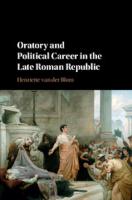
CUP (2016) h/b £74.99 (ISBN 9781107051935)
Tacitus’ Dialogus de oratoribus maintains that eloquence in public speaking was essential for a successful political career. This claim is supported by our major witness for political life in Republican Rome, Cicero. However, B. points out that there are many examples of successful politicians who were not considered excellent orators. This book therefore examines the careers of a range of politicians and tries to assess the importance of public speaking against other factors in their success.
B.’s introduction also examines various questions: was the Republic in fact a ‘democracy’ where speeches in contiones were crucial to political decision-making? Or is the older model of private decision-making in the Senate still correct? Was it essential to be a ‘good’ orator, or was it sufficient to be able to make adequate speeches when required?
Another problem is the existence of evidence. We may know that a politician spoke on a particular occasion but, apart from Cicero, we have no complete speeches extant. Aulus Gellius is an important source, and other writers quote or paraphrase speeches, but this evidence is often coloured by the purpose of the writer, whether Cicero’s highly biased views or Plutarch’s biographical aims. Indeed, did politicians routinely publish their speeches at all?
Part I, B. surveys the different settings available for oratory: the courts, the contio, the Senate. Different audiences would require different styles of speaking and offer different opportunities for the orator. This useful chapter goes on to investigate these settings in detail, explaining who might typically speak in the different arenas and how they might use them to further their careers. Other routes to political success are then examined: ancestry, wealth, building, patronage and networks, military career and intangible factors such as charisma.
In Part II, B. moves on to the main body of the book, an extremely closely argued and detailed survey of Republican politics focussing on the role that speeches played in different people’s careers. Each chapter deals with the career of a different politician: Gaius Gracchus, Pompey, Caesar, Piso Caesoninus, Cato and Mark Antony. For each chapter there is an extremely full and seemingly exhaustive list of speeches given, listed with date, place, topics discussed and sources. For some of these the evidence is extremely scanty but
they are listed none the less—the material for Gaius Gracchus is full of question marks.
In this survey B. is often redressing the balance caused by Cicero’s dominance of the period, which often colours current views of individuals. For example Cicero describes the oratory of Piso (included as an ‘average’ politician) as characterised by tarditatem ingenii, stuporem debilitatemque linguae (‘the dullness of your intellect and the slothful feebleness of your tongue’). However, B.’s analysis shows that in fact Piso was a powerful speaker whose oratory helped to further his career, although more important perhaps were his ancestry, networking, the patronage of Caesar and his public persona as moderate and peaceful.
Pompey is another politician whose oratorical ability is disparaged by Cicero. Again B., in 30 densely argued pages, surveys his career and concludes that his oratory was used successfully to boost his popularity, but other factors were also crucial—apart from his obvious military success he was a shrewd politican who knew the value of public display.
B. concludes that the most important factor in a successful Republican career was communicating a public persona to the audience and justifying career choices. While oratory in some form was necessary for this, brilliant oratory was not required—other factors could contribute to this.
This is an extremely useful and refreshing book, with interesting and thought-provoking reassessments of the politicians covered, which presupposes a thorough knowledge and understanding of the period.
Hilary Walters
